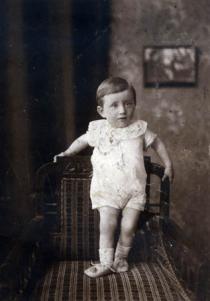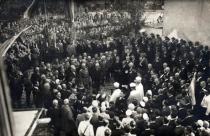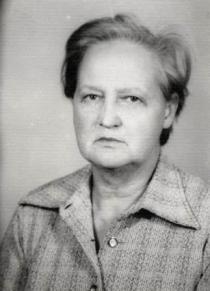Secret Service staff, where Mois Merkado Natan was an agent
This is the Secret Service staff, where I was an agent. The three men in uniforms are Russians, the woman is Jewish, Bela Sabeva. The picture was taken in Ruse in 1945.
In March 1943 when a probable deportation of the Jews was discussed for the first time openly, seven friends on mine (two girls and five boys) decided to go illegal so that nobody could send us to concentration camps. We all were Jews, and one of us turned out to be the secretary of the town committee of UYW, so he got in touch with the underground revolutionaries. It was the period when Ana Ventura was also illegal - the famous Ana Ventura - Jewish, daughter of one of the largest and richest industrialists in the town; she was killed later. On 19th March 1943 we decided to go illegal. Not only communists concealed us - there were also people who were anti-fascists and democrats. A humble villager offered us a shelter for a month, after which we moved to hide in a cave near Cherven village. We were not ready for such kind of life. We had almost no weapons, only a Turkish gun and two pistols. So we were just staying there and waiting. I went once or twice to the neighboring villages in order to make connection with the partisans - we expected to be relocated in the Balkan Mountains together with them. But the man who controlled the illegal activity in Ruse had us stay near the town for two months. His name was Nikola Popov, a former participant in the Spanish Civil War [1936-1939] and immigrant to the Soviet Union.
An accidental revelation happened when we were hiding in the caves: a child shepherd saw the youngest of us while he was at his post. This happened on 10th May and we scattered. The leader took with him a girl from our group, the other one managed to escape and I had to take the others out of that place because I knew the area. I led them to Svalenik village first - to one supporter of the partisans. We passed right through the center of the village - the police officers were in the tavern as we walked past them. And we did find the supporter of the partisans. He took us to a neighboring village - Katselovo. Meanwhile, our group leader left Tinka Dzhain [Born as Ester Sabitai Dzhain. She was an anti-fascist fighter of Jewish origin, a political commissioner of the Cerven's guerilla detachment. She was killed after the detachment was discovered in 1943.] to the care of one of the supporters in Bozhichen village, but he gave her away to the police and they killed her there. We remained three or four days in Katselovo, but the man who was concealing us got scared and he said he would take us to another place, so he started guiding us, but disappeared in the middle of nothing. This happened at night. We hadn't realized that the whole region was blocked and as we were moving forward we just came across the blockade. Guns went off several times and we hid ourselves in the nearest forest. During the night some of us wanted us to surrender, but a guy and I didn't accept it, because we didn't know whom we might come across and what they would do to us - they could kill us. We waited until the morning, came out of the forest and stepped in the hunting posse. So they caught us and arrested us. One of us - Salvador Papo, was stouter than the others and cocky, too - so he got the first thrashing because they thought he was the leader of the group. I was a skinny schoolboy - I weighed only 45. So we were taken to the police were we were detained for 45 days. We had a perfect 'brainwash' there - beating, beating as much as a human being could bear. Some of us couldn't endure it any more and they confessed they were members of the Union of Young Workers, but I never confessed it. We said we decided to run away because we didn't want to get deported.
In July we were brought to court and I was sentenced to 10 years of imprisonment. I was accused of taking part in a Jewish communist group. I was taken to the Ruse's prison, but during the bombardments we were moved to the jail in Pleven. I stood there until 8th September 1944. During that period my father, mother and brother were interned to the town of Somovit. The Jews from Ruse, Vidin and Pleven were not interned to other Bulgarian towns but they were prepared for deportation. So, my family lived in Somovit and they were awaiting their deportation. In the dress making unit of the camp there was a friend of my father's who approached him one day and told him: 'Bad news, they're going to move us from here', because a German officer had told him so. But on the other day, uncle Sinto (that was the name of the dressmaker) went to work and was told that everything bad had blown over. When he came back to the camp and broke the news, the people in the camp started celebrating that they were not going anywhere. This happened in September or in October 1943. There were many Jews in Somovit - some of them from Plovdiv, some - from Sofia and especially those who got arrested during the demonstration on 24th May. My parents and brother lived in Somovit for three months. After that they came back to Ruse and lived in the same room and store-room in the house of that friend of my father's. My father then used to make frames for mirrors together with one of my uncles, so that they could earn their living.
I got out of the prison in Pleven on 8th September 1944. We broke the jail, the police started fire on us, but we, the prisoners, slashed the cordon. There was a victim or two. After that we ran to the vineyard where we spent the night. In the morning everything was calm and we went back to Ruse. After that I worked for a year in the police. I was an intelligence officer at the State Security Service for a year. But after that I followed my father's advice - to complete my high-school education and to go to university. So I graduated from the high school and enrolled in the Ruse's Technical University. Later I applied for studying in the USSR. But then they played a trick on me - they hid my documentation. A member of the youth communist organization hid them, although he was in charge of submitting them. The reason was a simple envy - after which he confessed the fact to senior executives, but all the same - the deadline had passed. After that they sent me to Czechoslovakia as compensation, where I studied mechanical engineering. I learnt Czech language. My brother, after they closed the Ruse's Technical University, moved to Sofia, where he graduated from the Mechanical Electro-Technical Institute. My father worked in Ruse as a chairman of 'Clothes and Shoes' until he retired.





























